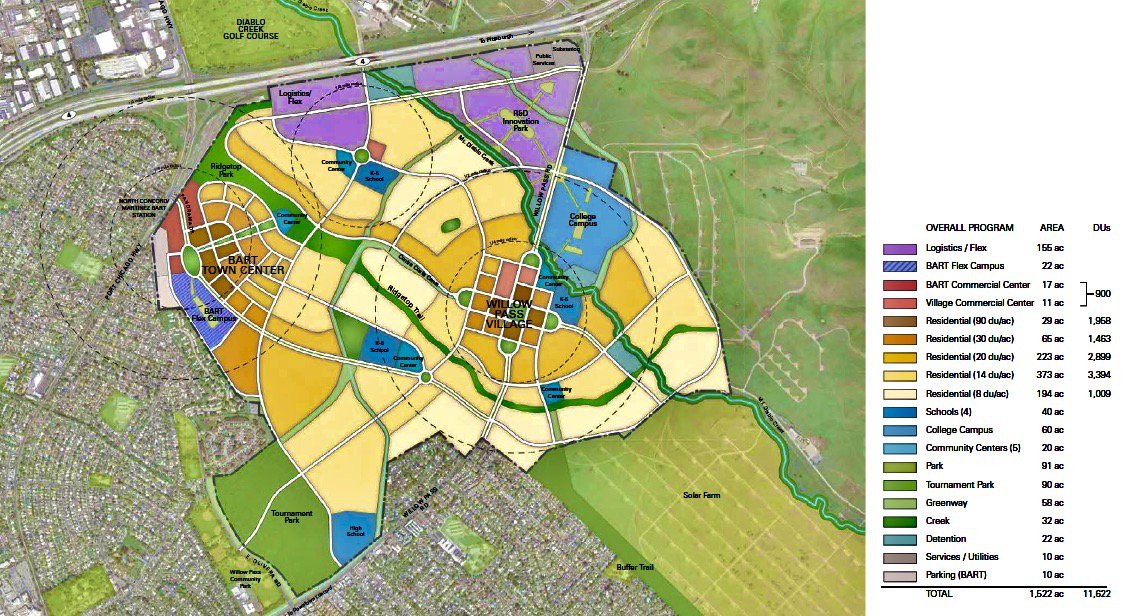
Military Base Reuse Project in Jeopardy Because of Project Labor Agreement Mandate
On Tuesday, January 7, 2020, the Concord City Council might derail many years of work planning for the reuse of a closed portion of the Concord Naval Weapons Station military base. Construction unions are demanding too much in negotiations with a Master Developer for a Project Labor Agreement on the reuse project. Their demands, if granted, will make the project financially infeasible.
The Concord City Council requires the Concord Naval Weapons Station developer to "negotiate in good faith" with the Contra Costa County Building and Construction Trades Council "to secure, one or more Project Labor Agreements for project construction."
As is typical with the Contra Costa County Building and Construction Trades Council, union negotiations are essentially "give us what we want or we'll stop the project." That is what is happening for the Concord Naval Weapons Station Reuse Project.
The city council has to decide whether to let the project proceed without a Project Labor Agreement or tell the developer that it's the Union Way or No Way. The staff report for the agenda item lists three possible directions:
1. Find that the Lennar PLA offer to the BTC and their efforts to negotiate one or more PLAs satisfies the requirements of Term Sheet Section 16.c
Lennar’s analysis, as independently confirmed by the City’s consultant team (HR&A Advisors, ALH Economics, and Arup), demonstrates that the project cannot support the level of union labor requested by the BTC without rendering Phase 1 of the project financially infeasible. By Lennar’s calculation the financing gap (difference) between their PLA offer and the BTC request for Phase 1 in net cash flow equals $546 million. The Internal Rate of Return (IRR) for Phase 1 drops from 17% to -0.1%. Further, Lennar has expressed an unwillingness to make further investments in the project if subject to the terms sought by the BTC.
A Council decision that Lennar satisfied Term Sheet Section 16.c. will help protect numerous community benefits designed into the draft Specific Plan (i.e. the Campus District, Tournament Sports Complex, 25% affordable housing goal and Mt. Diablo Creek restoration), Term Sheet commitments to provide $40 million in support for affordable housing, and $20 million in support of Council-directed enhancement programs. Lennar has expressed their intention to address the other labor terms found in Section 16 through their proposed horizontal PLA and other agreements.
Should Council make this finding, the BTC will likely oppose the project through all available means including possible challenges under the California Environmental Quality Act (CEQA), lawsuits and ballot measures.
2. Find that the Lennar PLA offer to the BTC and their efforts to negotiate one or more PLAs does not satisfy the requirements of Term Sheet Section 16.c
The BTC believes previous City Councils made a commitment to an “all trades” PLA for the Reuse Project. They believe the Term Sheet’s local hire, vocational training and incentive programs for military veterans found in Section 16 can only be achieved through the required use of their proposed level of union labor. They are also concerned that potential use of non-union labor on vertical construction could have a negative impact on future prevailing wage calculations. The BTC does not agree with the numbers or financial analysis provided by Lennar and evaluated by the City’s consultants.
Should Council make this finding, Lennar will likely relinquish their role as Master Developer for Phase 1. The City will either have to find a new Master Developer or find the public resources (tax dollars) to have the City serve as our own Master Developer. As the City already faces significant financial challenges, it is unlikely that the City could serve as its own Master Developer.
In order for a new master developer to propose a financially feasible project while also agreeing to the BTC’s proposed PLAs, paying the Navy for the property and paying back the City’s loans to the LRA with interest, a new project proposal would likely need to be developed with different land uses, land use densities, and public benefits. Creation of a new or revised development plan would require significant additional time and an undetermined amount of tax dollars.
At present, it appears that the Navy is likely to work with the City during a transition from the current master developer. However there is the possibility that the Navy could decide in the future to change the property transfer method from the current Economic Development Conveyance to the City to an Auction Conveyance directly to developers. Any change by the Navy in the conveyance
method would complicate the repayment of City loans by the LRA. Moreover, so long as the property remains in Navy possession, the Federal government retains control over how the property is used before transfer.
Additionally, the State recently passed AB 1486, which has requirements for publicly owned lands that influences how they are placed on the market; this new law will apply to the Phase 1 properties of the CNWS if the City or Lennar terminate the existing ENA. This will further complicate the future development of the property. (The City will be working with other jurisdictions to ask the legislature to consider modifications of this law to exempt federal lands.)
3. Continue this item for a specific purpose to a date certain
Both parties have indicated in several meetings and conversations that the negotiation over the use of one or more PLAs is at impasse. That is why the matter was referred by the Ad Hoc to the full Council. Continuing this item will, to the best of staff’s knowledge, result in Lennar relinquishing their role as Master Developer for Phase 1. Council should only consider this option for a specific purpose and to a date certain with the agreement of both parties.